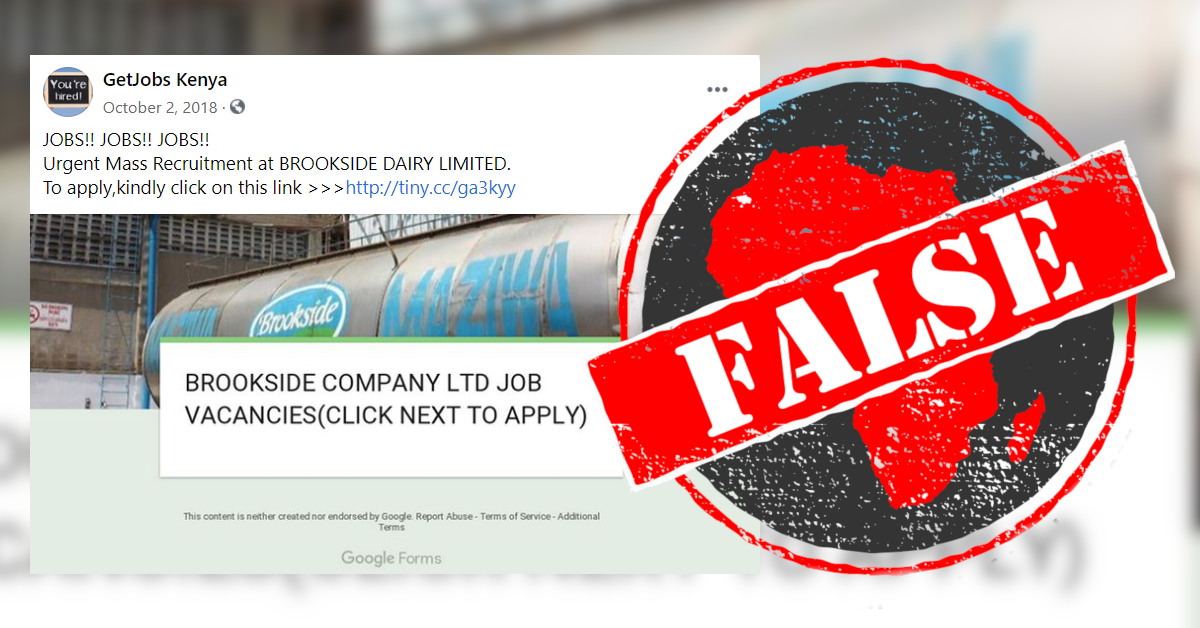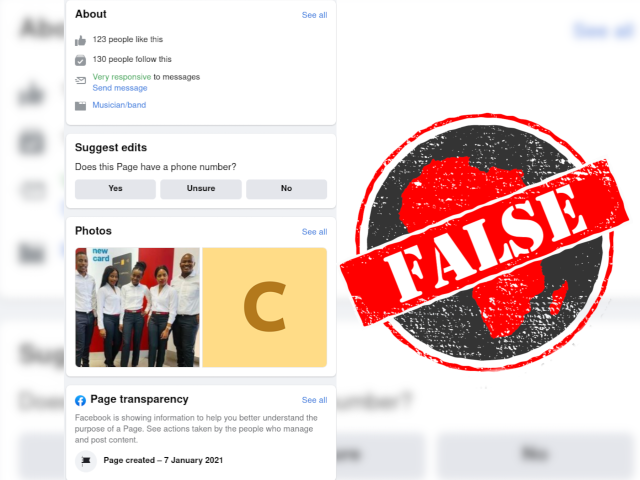The Facebook page “GetJobs Kenya” has been advertising fake job vacancies for more than three years.
Since it was created on 30 May 2017, the page has targeted job seekers in Kenya.
On 2 October 2018 the page advertised vacancies at Kenya’s biggest milk processor, Brookside Dairy. Africa Check found the ads to be fake.
On 13 October 2018 it advertised vacancies at Jomo Kenyatta International Airport. Africa Check debunked this too.
But even after its posts were rated false, the page posted more fake ads.
The latest to be flagged by Africa Check was a July 2020 job ad targeting textile factory Rivatex East Africa Limited.

The jobs ads on the page usually link to a blog that lists various opportunities, promising good salaries.
Entry requirements are usually as simple as having a national identity card, an active mobile phone and a bank account.
Each ad has a condition for applying. It asks job seekers to pay for “registration”.
This is a big red flag that the ads are fake. Companies across Kenya and the rest of Africa have repeatedly told Africa Check that they do not charge potential employees during the recruitment process.
Beware of fake job adverts appearing on this and other Facebook pages. To protect yourself against scams, see our guide to Facebook scams and how to spot them. And report any suspicious Facebook pages or posts on the “page transparency” section or by clicking “report post” on the top right of any post. – Dancan Bwire
Since it was created on 30 May 2017, the page has targeted job seekers in Kenya.
On 2 October 2018 the page advertised vacancies at Kenya’s biggest milk processor, Brookside Dairy. Africa Check found the ads to be fake.
On 13 October 2018 it advertised vacancies at Jomo Kenyatta International Airport. Africa Check debunked this too.
But even after its posts were rated false, the page posted more fake ads.
The latest to be flagged by Africa Check was a July 2020 job ad targeting textile factory Rivatex East Africa Limited.

Blog with fake vacancies, asking for payment
The jobs ads on the page usually link to a blog that lists various opportunities, promising good salaries.
Entry requirements are usually as simple as having a national identity card, an active mobile phone and a bank account.
Each ad has a condition for applying. It asks job seekers to pay for “registration”.
This is a big red flag that the ads are fake. Companies across Kenya and the rest of Africa have repeatedly told Africa Check that they do not charge potential employees during the recruitment process.
Beware of fake job adverts appearing on this and other Facebook pages. To protect yourself against scams, see our guide to Facebook scams and how to spot them. And report any suspicious Facebook pages or posts on the “page transparency” section or by clicking “report post” on the top right of any post. – Dancan Bwire
Republish our content for free
For publishers: what to do if your post is rated false
A fact-checker has rated your Facebook or Instagram post as “false”, “altered”, “partly false” or “missing context”. This could have serious consequences. What do you do?
Click on our guide for the steps you should follow.
Publishers guideAfrica Check teams up with Facebook
Africa Check is a partner in Meta's third-party fact-checking programme to help stop the spread of false information on social media.
The content we rate as “false” will be downgraded on Facebook and Instagram. This means fewer people will see it.
You can also help identify false information on Facebook. This guide explains how.





Add new comment